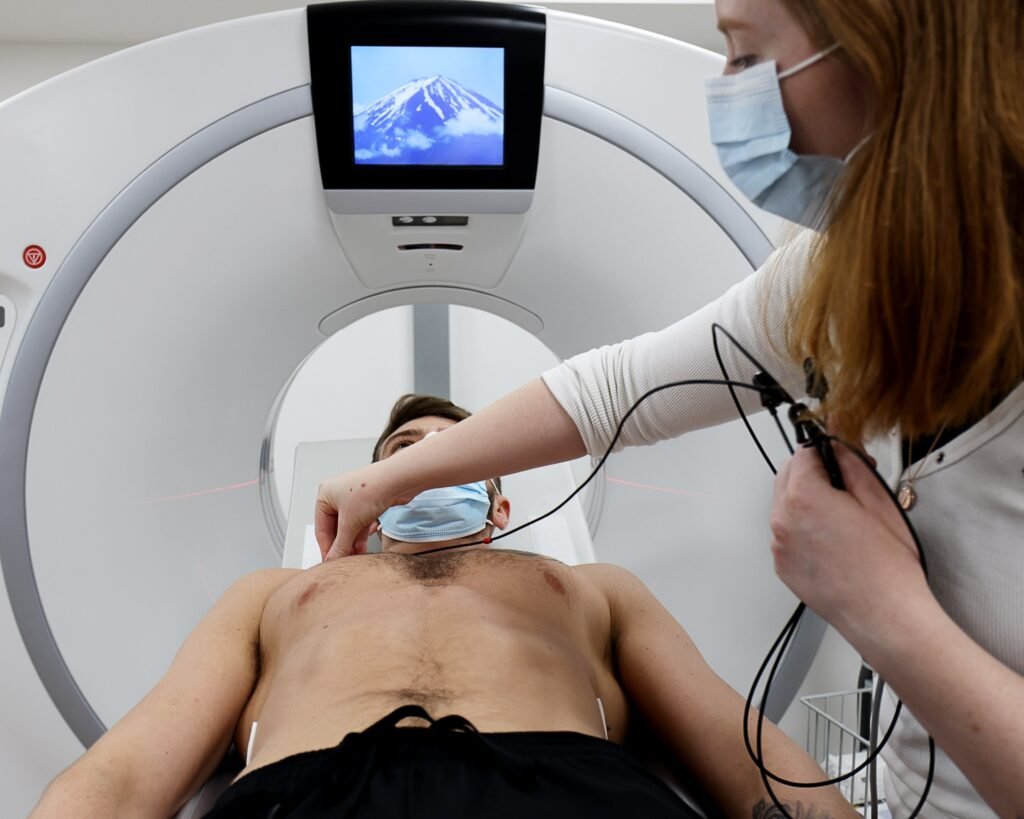Going for hear diagnostics such as angina, can be very stressful. At Venturi Cardiology, we want to give our patients the best experience in what is clearly a difficult time of their life. We know from chatting with our patients that giving them clear information about the test they are having; their results and next steps often helps reduce anxiety. In this article we unpack what you can expect if you come in our clinic here in Warrington. This is not just an angina diagnosis center but is an independent cardiology clinic.
What is Angina?
Angina often manifests as chest pain. You may feel a tightness or heaviness around your chest, which can spread to the arms, neck, jaw or back. It’s often triggered by physical exertion or stress and will stop after a few minutes of rest. The symptoms of angina are caused by a reduced flow of blood to your heart muscles. However, it’s essential to understand that angina is not a disease in and of itself; it is usually an indicator of other potential complications such as heart disease or stroke.
Though angina is treatable and is not usually life-threatening, it is still a severe condition. If left untreated, it can lead to coronary heart disease, the leading cause of death worldwide. More than two million people in the UK alone have been diagnosed with angina, and there are an estimated 96,000 new cases each year.
Though the survival rate for heart and circulatory illnesses has increased significantly ( 168,000 deaths from 320,000 deaths in 1961), the British heart foundation estimates that more than half the population will suffer from a heart or circulatory condition in the UK at some point in their lifetime.
For this reason, cardiologists play a vital role in the diagnosis, testing and treatment of angina.
What is the role of the cardiologist
Cardiologists diagnose, examine and treat patients with cardiovascular system diseases and
defects – i.e. the heart and the surrounding vessels.
There’s a difference between a cardiologist and a heart (cardiac) surgeon. While a heart surgeon opens the chest to carry out a heart surgery, a cardiologist focuses on testing, diagnosis and treatment. They may, however, perform more minor surgeries, such as heart catheterisations, angioplasty, or inserting pacemakers
Training to become a cardiologist is a highly competitive and extensive (8 years long) programme. However, doctors continue to be drawn to the field as the demand for cardiologists continues to grow. This is evidenced by the fact there are more than 100,000 hospital admissions in the UK each year due to heart attacks, with coronary heart disease by far the most common type of heart disease. As such, cardiologists are tasked with understanding the process of disease and disease prevention. As well as improving survival rates and quality of life following a heart condition.
To achieve this, several tests can give an insight into potential heart conditions.
Tests for heart disease
The most common tests for heart disease and angina are:
- ECG (electrocardiogram): Which measures the electrical activity and rhythm of the heart. For angina, this test may be conducted on a treadmill or exercise bike to determine if an attack (chest pain) occurs.
- Blood tests: These can identify enzymes (troponin) that indicate the heart is suffering from angina. It will also reveal cholesterol levels that might indicate the risk of heart disease.
- Coronary angiography: This scan can show doctors your heart and blood vessels using a dye.
Treatment
Angina treatment depends on the type of angina you suffer from:
Stable Angina
This type of angina is an attack triggered by physical exertion to stress. It’s the most common angina type and will usually ease off after a few minutes of rest. Treatment for stable angina is designed to help control these attacks, for instance:
Glyceryl Trinitrate: is used to relax and widen your blood vessels, allowing more blood to flow to your heart muscle during an attack.
Beta-blockers: This blocks the release of adrenaline, so the heart beats slower and reduces blood pressure.
Calcium blockers: This increases blood flow to the heart by widening and relaxing the muscle cells in the arterial wall of the heart.
Unstable Angina
This type of angina attack may not be set off by exertion or stress. It can persist even after rest and can be very unpredictable. For this reason, it is more serious than stable angina. Treatments for this type of angina are designed to prevent blood clots and reduce the risk of heart attacks or strokes and are as follows:
Aspirin: Prevents blood clots by reducing the ability to form clots. As a result, it’s easier for blood to flow through narrow arteries.
Clopidogrel: This prevents clots from forming by making pallets less likely to stick together.
Your physician may also recommend that you make some changes to your lifestyle, such as increasing your exercise or changing your diet. At Venturi Cardiology, our private cardiologists will provide you with a personalised and detailed plan that you can take back to your GP. There’s no need to wait for an NHS referral; you can book an appointment quickly with our affordable payment plans.
If you’re feeling uncertain about your health, it is best to seek treatment immediately. We can provide you with comprehensive testing, same-day results and professional treatment recommendations so that you can feel reassured about your health.
